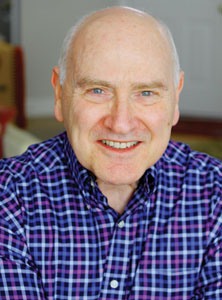 Jack Katz, Ph.D. entered the field of audiology with a goal to help people. Decades later he remains focused on that goal as a leader in the field.
Jack Katz, Ph.D. entered the field of audiology with a goal to help people. Decades later he remains focused on that goal as a leader in the field.
Katz, 77, will receive the American Speech-Language-Hearing Association’s highest accolade at the association’s annual convention Nov. 17-19.
As an audiologist, Katz works with patients who have hearing loss and/or auditory processing disorders.
“I was a learning disabled child in school,” Katz said.
He said his experience overcoming disabilities led him to a field where he could help other students with disabilities. When Katz learned about a career in audiology he said it seemed like a perfect fit. And today he remains pleased with his choice.
Fellow audiologist Donna Geffner nominated Katz to receive Honors of the Association.
“He is one of the giants in the field of audiology,” Geffner said. “He’s really revolutionized some of our thinking in the field.”
Katz created the “Handbook of Clinical Audiology” more than 35 years ago. The textbook is now in its sixth edition and has become a staple in the field.
“His handbook has been just that, a handbook of audiology used by everyone in the field,” Geffner said. “There is no question that it is one of the premier textbooks in the field.”
Katz said the idea came to him on a visit to his in-laws during Passover. Katz wanted a comprehensive hand-book for the field. He began to brainstorm ideas for chapters and the experts who would be best to write each chapter.
When Passover ended Katz asked colleagues to collaborate with him on the handbook. Katz edited the book and wrote a few of the chapters.
“It’s the most comprehensive text,” Katz said.
Katz took a practical approach to the handbook. He said he thought of things he wanted to know as a practitioner as well as things audiology students needed to know. Katz said he created the book to be a resource to help audiologists better serve their patients.
Katz has used that patient-centered focus throughout his career. Katz conducted research and taught audiology students at the University of Buffalo.
When Katz retired he and his wife moved to Kansas City to be near their children and grandchildren.
But Katz didn’t stay retired long. He joined the faculty at the University of Kansas and started a private practice at age 70.
“This has been just terrific,” Katz said of his private practice. “I loved teaching, and it is wonderful, but this is extraordinary.”
Katz’s patients range in age from 5 to 80, although most are children. He said he loves to see the progress his patients make from session to session.
“It’s just a marvelous feeling,” Katz said.
Despite Katz’s long list of career accomplishments, he said the honor from the American Speech-Language-Hearing Association took him by surprise. He said he was “just dazed” when he was informed of the honor in a phone call from the association’s president.
But the honor did not come as a surprise to those closest to Katz.
“He has an amazing dedication to wanting to help people overcome difficulties in communication and learning,” Katz’s son, Mark Katz said. “He is well known for the research he has done and the tests that he has developed.”
Katz’s daughter, Miriam Kaseff, said the honor came as no shock to her either.
“My dad is known throughout the world for his work,” Kaseff said. “I’m so proud of him and am thrilled that he is being recognized for his accomplishments.”
Katz’s book, the “Clinical Handbook of Audiology,” is used throughout the world and has been printed in several languages, including Italian, Portuguese and Chinese.
Geffner said she considered Katz a shoe-in for the honor when she nominated him.
“He had tremendous name recognition,” Geffner said. “There is nobody who doesn’t know Jack Katz.”
Geffner served as president of the association in 1999 and is familiar with the criteria for the honor.
“You have to distinguish yourself in your profession and show what you have accomplished has really changed the profession in a significant way,” Geffner said. “(Katz) has really made changes in the profession.”
Katz has made a name for himself as an all-star in the profession, but Geffner said one of his greatest qualities is his ability to remain down-to-earth and approachable.
“He’s never too busy for people. It’s amazing,” Geffner said. “He just makes himself so accessible to people.”
Katz entered his career with a focus on helping people, and that remains his focus today.
“One thing I would love to do is help the Kansas City Missouri School District,” Katz said.
Early intervention can make world of difference for students with auditory processing disorders, Katz said.
While many of Katz’ colleagues have fully retired he said he has no plans to slow down anytime soon.


